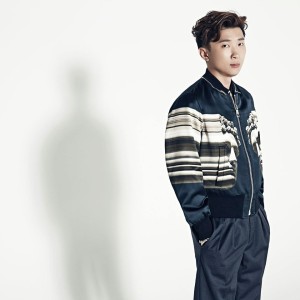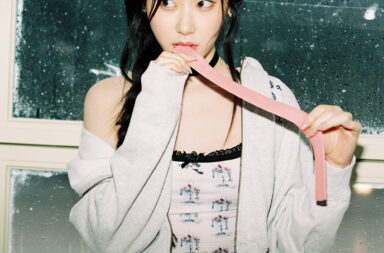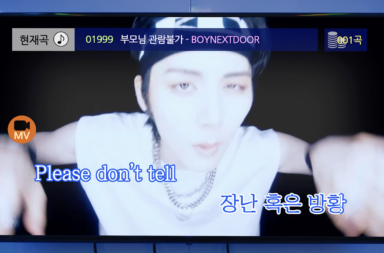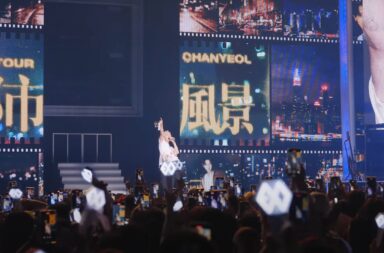 Primary has been keeping himself busy the last couple of years with an ever growing list of impressive production work.
Primary has been keeping himself busy the last couple of years with an ever growing list of impressive production work.
His last major release was his Primary and the Messengers album which had a string of gems sprinkled throughout the LP. Primary seems to have adopted a slightly retro touch with his works on his latest album 2. The producer integrates a variety of genres including gospel, R&B, reggae, and hip-hop and uses live instruments to add an organic touch to the set.
It is important to note that a lot of these songs stand out well on their own; but as a cohesive album, there are moments when things don’t come together or songs get pulled into a repetitive tempo. This can likely be attributed to the massive list of features on the album. There is everyone from Beenzino, to Lena Park, to Jessi and AOA‘s Choa. However, Primary still knows how to make the vocalists and rappers pop in his songs.
Things kick off with “See You (조만간 봐요)” featuring BSK (Kim Bum-soo) and Gaeko. A gospel organ opens into a nice Bruno Mars sounding mid tempo. This sets the tone of the LP as one that will be quite easy to listen through. BSK’s voice has a sincerity to it that fits well to this R&B influenced pop number. The song is cheerful, but there is an underlying desperation to the vocals. The lyrics speak to an almost one sided love where the other party isn’t giving the singer any time of day:
“See you soon, that’s what you always say
I know it’s a promise that won’t be kept but I still like it anyway
So see you when? Tell me the exact date please”
Gaeko adds another dimension with his rap that explores the protagonist’s dissatisfied emotions dealing with the push and pull of the relationship.
Next is the sleek “Mannequin (마네퀸).” Suran adds her voice to this snappy number with Beenzino providing the rap bridge. What I enjoy about this piece is that the horns aren’t merely used as a melodic garnish and instead add a haughty, spicy air to the jazz inspired song. Lyrically, this song is criticizing a stiff feminine ideal. The ideal woman is this chic woman with “long legs, thin waist” and someone with clacker heels and an expensive taste. Suran laments how people will only notice this type of person. Beenzino provides a rap that adds onto the superficiality of this caricature woman by saying how he is willing to spend on someone with “your body and your face,” and his rap further highlights the how this standard can reinforce this model. Females that can meet this unrealistic mannequin standard get rewarded and given attention.
Ohhyuk makes an appearance on “Rubber (러버).” There is a funky bassline that probably is Primary’s signature sound that sets off the song. No stranger to a Primary beat, Ohhyuk’s buttery voice works well in this song that’s talks about two very different people who are dating. Where the song could’ve been bogged down by an all too standard beat, it adds color with a capricious spirit. The “nanana” parts are interspersed — showing how the protagonist is past the point of caring. These moments also precede another shift. What follows is a reverb sounding hum that lies on a bed of synths and feels like an introspective moment of reasoning in line with the lyrics. “Rubber (러버)” ends with an indignant return to his lover despite his long list of grievances to not continue their relationship.
“Paranoia (피해망상)” takes an industrial approach to creating a sense of isolation. Sunwoo Jung-ah is haunting as she bemoans feeling tortured in a relationship. This isn’t just a partnership gone awry, this is clearly an abusive one that will forever cause pain to the narrator of the story:
“Your eyes that looked at me, the clear brown color, never blinking once
I’m scared that it’ll follow my strange anger-filled life forever”
The eyes are said to be the things that stare into our souls. In this case, it’s the thing that disrupts another’s life — leaving a smudge on the equilibrium of their life. Gaeko also adds a verse that seems to point to the criminal nature of the acts, explaining the perpetrator’s methodology — one of calmness but completely premeditated. “Paranoia (피해망상)” is an abrupt shift in tone in the context of the album, but it works to disrupt the sense of complacency a listener would have — similar to the disorientation of someone who undergoes such duress.
A change up from the industrial drum machine beat of the prior track, “Don’t Be Shy (아끼지마)” tries its hand in reggae. AOA’s Choa is coy in this song. She wants to entice this person to make the next move. The breakdown leading into Iron‘s rap is welcome and builds this tension between the two characters of the song. Iron waxes poetic about what he would like to do. The song began shyly sensual but reaches this sexual peak by the end.
Another tonal change occurs during Yankie and Jessi‘s “Just Like U.” It’s a slightly argumentative hip-hop number that fields two opposing perspectives. Jessi opens with a phone call expressing her disdain for being considered a booty call. Yankie then speaks out about how he considers his girl important, but he doesn’t want to be bogged down by labels — hoping they can both just do their own thing, independently. However, when Jessi puts her two cents in, you can’t help but feel like she’s laying down the law. She mentions how he doesn’t even text her to hang out even though she cleared her schedule for him. Jessi sets him straight. She has self worth, knows what she wants, and is willing to compromise:
“I thought you were different, is that all you can be?
I’ll give you another chance, answer me, I’ll lay it out for you
You get it? See you tomorrow, motherfucker”
It’s a matter of perspective and figuring out what they each want. There’s also a really nice saxophone breakdown that happens at the end — jazzing up the song. They go back and forth, and it adds some heat to an album that favors the more subdued messages.
Next up, Junggigo sings on “Tonight (머리 세웠어).” It reverts back to that funky bassline. The production on this kind of falls flat as it doesn’t do enough to differentiate itself and becomes rather forgettable. The one thing that does work in its favor are its lyrics. It takes a glimpse into a guy’s preparation for the night he is about to have and expresses an underlying excitement for it. Unfortunately, even the lyrics couldn’t add fire to this slow burner.
“Hello (네일 했어)” spruces up the album with a retro freshness. Things take an upbeat turn ,and Lena Park’s voice is expressive adding dimension to production. Lyrically, this song nicely juxtaposes the prior song as it takes a look at the preparation some women may take before going out. What works well is the feeling that comes through — there’s a strong sense of walking down a street beaming with sunshine in hopeful glee. There is a feel good throwback vibe that is retro with the small synth moments sprinkling nostalgia on the song.
With a slightly higher tempo guitar picking, Mamamoo‘s Hwasa fronts “Mileage (마일리지).” The set up is simple with Hwasa expressing her need to get away and take a trip. Working all week long has led to an accumulation a mileage that she now wants to expend in a vacation of sorts. Paloalto jumps in for sixteen bars and expresses unique options for getting out of the city. The song works well because Hwasa’s voice is versatile. She starts off in an unaffected manner and reaches her breaking point as her lower register shifts inflection. She also provides some great adlibs at the end telling everybody to rid themselves of their mileage, their burdens and stress.
“She’s (그녀는)” starts off with a static filled organ before Jung-in breaks through that hazy feel. There are a few rap features on this track with Choiza, Hangzoo and Geegooin of Rhythm Power all contributing verses to this track. I enjoyed the rap verses a lot. They each started off with the line “her lips were especially red,” before going exploring each person’s individual memories. I especially enjoyed the second rap verse:
Our first date was like a novel
She ran out to the road and I hit her with my car
I quickly got out and saw her big black eyes filled with tears
Oh god, as if she just broke up with someone
It was just a slight bump but my thoughts became jumbled up
I was sorry so I bought her dinner, again and again and again”
These individual stories each have a lot of color and individuality to them. It works well because of the production’s simplicity. Jung-in’s voice dials in covered in a haze of nostalgia which adds to the effect of revisiting these intimate memories of a girl in each rapper’s past.
 “Gold Finger (골드핑거)” starts off with this repetitive ‘doop’ set behind a backdrop of birds chirping. It is a suburban idealistic fantasy with a twist. Suran comes in with strong verses about how people follow her and envy her. She realizes her power and acknowledges being the one with the gold finger.
“Gold Finger (골드핑거)” starts off with this repetitive ‘doop’ set behind a backdrop of birds chirping. It is a suburban idealistic fantasy with a twist. Suran comes in with strong verses about how people follow her and envy her. She realizes her power and acknowledges being the one with the gold finger.
During the chorus, I’m not entirely sure if she’s trying to convince herself that she’s the best and happy, but she realizes the power she wields. Because people follow her and she can make them happy, she uses that gold finger of hers to spread the love. It plays like a utopian fever that suddenly adds some psychedelic effects, but it stands out because of its unconventional approach to soft power.
Last on the album is “U” which features both Kwon Jin-ah and Rap Monster. Kwon Jin-ah’s voice is lovely and reserved. “U” is an ode to a significant other from the past that the protagonist imagines seeing and hearing. The song has strings, a drum snare, and a piano melody, but I felt like the song could have probably benefited from maybe one less element. There is a wistfulness at work here that underlies an even more unsettled depth, but it is only waded in. Rap Monster dives deeper as he questions why this person keeps appearing in unexpected parts of his life — like his album and suddenly larger than expected bed. There comes a realization that perhaps the reason these thoughts keep coming back to them is because they really do need this person to be present in their lives.
Primary’s album is a great listen. The tracks aren’t overblown with loud instrumentals and instead lend the focus to the vocalists and rappers. The features were well chosen because the simplistic composition gave a stage for these artists to shine. There are nice lyrical moments and critiques on societal values which add layers of substance to the album. The retro glint is also highlighted well with the use of live instruments. My main gripe is that some composition can get dull with the same formula of husky vocal with a rap break. The funky bassline is also probably used one too many times. Overall, Primary is still impressive. 2 is pleasing to the ears and is not only great for casual listening but there are some wonderful, understated moments on 2 that will keep me spinning the LP for a while.
Album Rating: 4.5/5


